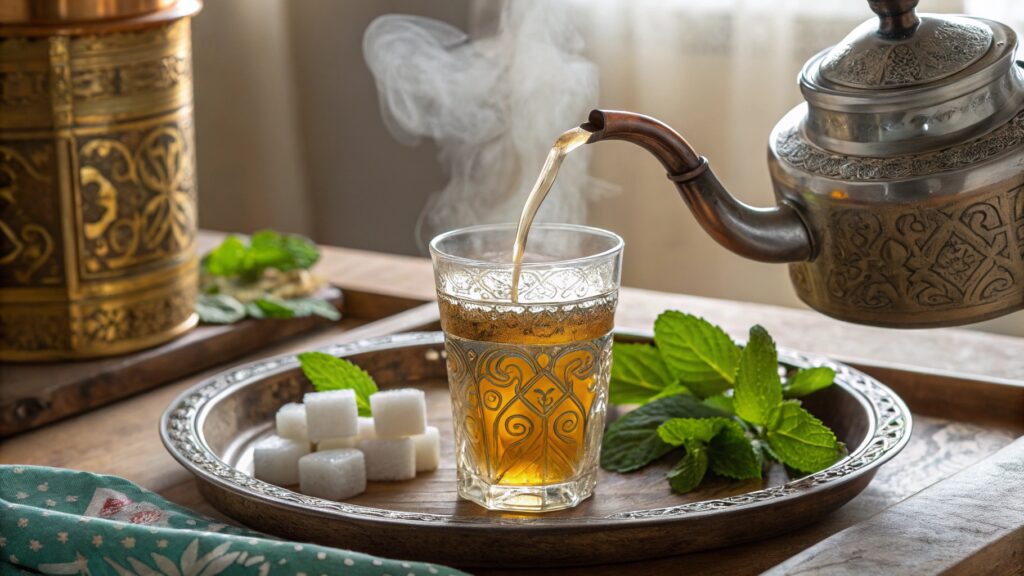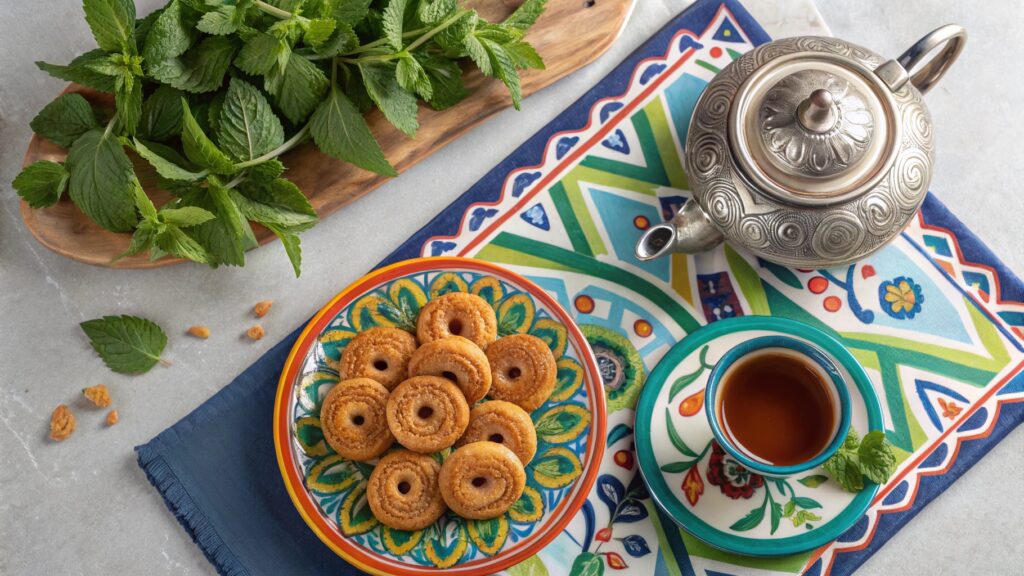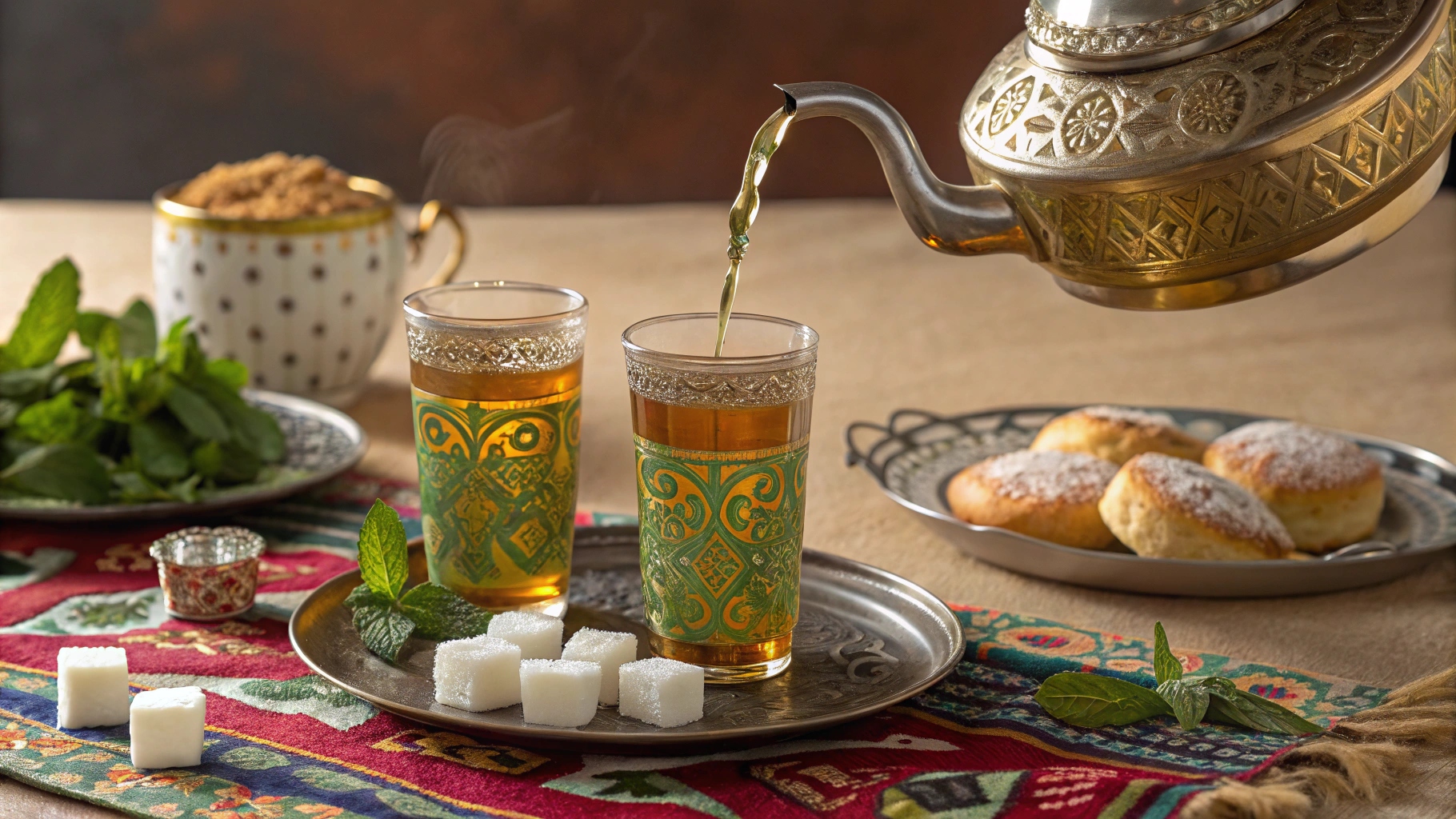Table of Contents
If there’s one drink that can instantly transport you to the heart of Morocco, it’s a glass of fragrant, minty, sweet Moroccan tea. It’s more than just a beverage — it’s hospitality in a glass, served at every gathering, big or small. Whether you’re walking into a friend’s home, shopping at a bustling market, or negotiating a deal in a souk, Moroccan tea is always part of the moment.
In this guide, I’ll walk you through the fascinating history, how to make it at home, common mistakes (and how to fix them), plus all the wonderful health perks hiding in each glass. Ready to become a Moroccan tea master? Let’s dive in!
Introduction to Moroccan Tea: A Symbol of Hospitality and Culture
In Morocco, offering tea isn’t just polite — it’s a cultural tradition woven into daily life. Tea is how Moroccans welcome guests, close business deals, and connect with family. It’s not just about the taste (although that’s amazing too), but the ritual and presentation that make it special.
Picture this: A beautifully decorated silver teapot, gently steaming. A vibrant tray of gold-rimmed glasses. Fresh mint leaves piled high, and the sweet aroma of brewed green tea with sugar and herbs floating through the air. That’s the essence of Moroccan tea — it’s warmth, culture, and ceremony all poured into a glass.
The Rich History of Moroccan Tea: From Trade Routes to Teapots
Did you know that tea isn’t native to Morocco? Surprise! Tea actually traveled to Morocco through ancient trade routes. Some say it arrived via British merchants in the 18th century, others argue it came even earlier from China’s Silk Road.
However it got there, one thing’s for sure — Moroccans made it their own. They added their signature twist: fresh mint, generous sugar, and dramatic pouring techniques. Today, Moroccan tea is instantly recognizable and has become a symbol of Moroccan identity itself.
💬 “Moroccan tea is more than a drink — it’s a bridge between past and present, between host and guest.” – Traditional Moroccan Saying
Essential Ingredients for Authentic Moroccan Tea 🌿
Want to make the real deal at home? It all starts with the right ingredients. Moroccan tea is simple at heart, but every ingredient matters. Here’s your shopping list:
| Ingredient | Quantity | Notes |
|---|---|---|
| Chinese Gunpowder Green Tea | 1 tablespoon | The bold, smoky base |
| Fresh Mint Leaves | Large handful | Spearmint preferred |
| Granulated Sugar | 3-5 tablespoons | Adjust to taste |
| Boiling Water | 4 cups | For steeping |
| Optional Add-ins | Pinch | Like orange blossom water or verbena |
Choosing the Right Tea: Types and Quality Explained
Not all green tea works for Moroccan tea. The traditional choice? Chinese Gunpowder Tea. It’s called “gunpowder” because the leaves are tightly rolled into tiny pellets that look like — you guessed it — gunpowder grains.
Why is this type so special? It’s strong and smoky, so it holds up beautifully against the sweetness of sugar and the freshness of mint. Skip the fancy flavored green teas — you want pure, bold leaves.
Fresh Mint Matters: What to Look for When Buying
Mint isn’t just garnish — it’s the soul of Moroccan tea. You’ll want fresh spearmint if possible (it’s milder and sweeter than peppermint). When buying, look for bright green leaves, avoid wilted or browning ones, and give them a sniff — they should smell vibrant and sweet, never bitter.
💬 “Fresh mint makes all the difference. Old mint equals flat tea.” – Moroccan Tea Proverb
Sugar and Sweetness: Finding the Perfect Balance
Moroccan tea is known for its sweet kick, but how much sugar is “right” depends on personal taste. Traditional versions use a LOT — sometimes several cubes per glass. If you prefer a lighter touch, start with 2-3 tablespoons per teapot and adjust from there.
🍬 Pro Tip: For authentic flavor, use white granulated sugar. Brown sugar or alternatives will change the clean, bright taste Moroccans love.
Traditional Moroccan Tea Ceremony: The Art of Pouring and Serving 🍵✨
If you think making Moroccan tea is just boiling water and tossing in some mint, think again! In Morocco, preparing tea is an art form, and the ceremony itself is part of the magic. It’s about more than flavor — it’s a performance of hospitality, meant to impress guests and show care.
Step into a Moroccan Home…
You’ll see a tray gleaming with colorful tea glasses, each one a work of art, and in the center, a tall, elegant silver teapot. The host brews the tea with graceful precision, and when it’s ready — the real show begins.
They lift the teapot high above the glass, pouring the hot tea in a long, glittering stream. Why? It’s not just for drama (though it looks incredible) — the high pour helps create a delicate foam on top, known locally as “the crown.” No foam? No respect. That’s how important it is!
💬 “The height of the pour reflects the height of the respect for the guest.” – Moroccan Tea Tradition
Step-by-Step Recipe: How to Make Authentic Moroccan Mint Tea 🫖

Want to recreate that magic at home? Here’s the exact process, straight from Moroccan kitchens.
Step 1: Rinse the Tea Leaves
Start with 1 tablespoon of Chinese Gunpowder Tea in your teapot. Pour in about half a cup of boiling water — swirl it around to rinse away bitterness, then discard that water.
Why rinse? This removes dust and reduces harshness, leaving you with a smoother brew.
Step 2: Brew the Base Tea
Add about 4 cups of boiling water to the teapot with the rinsed tea leaves. Let this brew for 5 minutes so the bold, smoky flavor can develop.
Step 3: Add the Sweetness and Freshness
Toss in a generous handful of fresh mint (stems and all — that’s where the flavor hides). Add 3-5 tablespoons of sugar, depending on how sweet you like it.
Step 4: Mix the Tea the Moroccan Way
Here’s the fun part! Instead of stirring with a spoon, Moroccans mix the tea by pouring it. Pour a glass of tea, then pour it back into the pot. Repeat this a few times to blend the flavors evenly. This also helps aerate the tea, softening its flavor.
Step 5: The Dramatic Pour
Finally, the signature move — pour the tea into each glass from high above. This creates that famous foamy crown and shows off your tea-making skills.
Block Quote 💬
“Making Moroccan tea isn’t just cooking — it’s storytelling, hospitality, and flavor all in one.” – Moroccan Tea Lover
Common Problems and How to Fix Them When Making Moroccan Tea 🚨
Even though it’s a simple drink, plenty can go wrong if you’re not careful. Don’t worry — I’ve got your back with quick fixes for the most common Moroccan tea fails.
Problem 1: Bitter Tea 😬
Why it happens:
- Tea leaves brewed too long.
- Water too hot during steeping.
- Low-quality stale tea leaves.
Easy Fix:
- Rinse your leaves well before brewing.
- Steep for just 5 minutes — no longer.
- Use freshly boiled water, not water that’s been sitting in a kettle for hours.
Problem 2: Weak or Flavorless Tea 😴
Why it happens:
- Not enough tea leaves.
- Old, flavorless mint.
- Too much water for the amount of tea.
Easy Fix:
- Use a heaping tablespoon of tea per pot.
- Always choose fresh mint — the brighter the leaves, the better.
- Stick to the classic 4 cups of water ratio.
Problem 3: Cloudy or Murky Tea 🌫️
Why it happens:
- Over-brewed tea leaves.
- Skipped the initial rinse.
- Poor-quality water (hard water can cloud tea).
Easy Fix:
- Always rinse tea leaves first.
- Use filtered or soft water.
- Brew for the right time — short and sweet is better than long and bitter.
Nutrition Facts (Per Glass – Approximation)
| Nutrient | Amount |
|---|---|
| Calories | 45 kcal |
| Carbohydrates | 11 g (from sugar) |
| Fat | 0 g |
| Protein | 0 g |
| Sodium | 2 mg |
| Antioxidants | High (thanks to green tea) |
Want to take your tea game to the next level? In Part 3, I’ll share fun variations, serving tips, health benefits, and even the best Moroccan treats to serve alongside your Moroccan Tea
Variations of Moroccan Tea: Regional Twists and Modern Takes 🌍🍵

One of the coolest things about Moroccan tea is how it evolves as you travel across the country — and even beyond! Different families, towns, and regions put their own spin on this iconic drink. If you’re feeling adventurous, why not try some fun variations?
Green Tea vs. Black Tea in Moroccan Brewing ☕️
While gunpowder green tea is the classic choice, some modern twists use black tea for a richer, bolder flavor. Black tea versions are less grassy and more malty, but they need shorter brewing time to avoid overpowering bitterness.
🌱 Traditionalists say: Green tea is the soul of Moroccan tea. Adventurers say: Black tea adds boldness. Who’s right? Both!
Adding Spices: Cinnamon, Ginger, and More 🌿
In cooler mountain areas, it’s common to spice things up (literally). People throw in cinnamon sticks, cloves, or even a slice of ginger into the pot, creating a spiced Moroccan chai. It’s warming, aromatic, and perfect for chilly evenings.
Bonus Twist: Orange Blossom Moroccan Tea 🌸
A splash of orange blossom water gives your tea a delicate floral perfume. It’s a popular twist for weddings or celebrations, adding elegance to every sip.
Best Occasions to Serve Moroccan Tea: Everyday Moments to Celebrations 🎉
The beauty of Moroccan tea? It fits any occasion. Morning, afternoon, or evening — there’s always a good reason to brew a pot. In Morocco, tea is especially important during:
- Family gatherings — It’s served after meals, alongside sweet pastries.
- Business meetings — Tea breaks the ice before negotiations start.
- Celebrations — Weddings, religious holidays, and even casual birthdays get the tea treatment.
Want to impress your guests? Learn the high pour technique — nothing says “I know my tea” like a smooth, dramatic pour from a silver teapot.
Pairing Moroccan Tea with Traditional Treats and Snacks 🍪
Tea is rarely served alone in Morocco. It almost always comes with a side of something delicious — and if you’re doing it at home, you should too. Here’s a cheat sheet of perfect pairings:
| Treat | Description |
|---|---|
| Kaab el Ghazal | Crescent-shaped almond pastries, lightly scented with orange blossom. |
| Chebakia | Sesame honey cookies, deep-fried and sticky-sweet — perfect for Ramadan. |
| Dates and Nuts | Simple but satisfying — sweet dates balance the minty tea perfectly. |
| Almond Briouat | Crispy filo parcels filled with sweet almond paste — heavenly. |
💬 “Tea without treats is like a sky without stars — it’s just not complete.” – Moroccan Proverb
Health Benefits of Moroccan Tea: More Than Just Flavor 💪🍵
Sure, it’s delicious, but Moroccan tea also brings some pretty awesome health perks thanks to its green tea base and fresh mint. Here’s why every sip does your body good:
Antioxidant Powerhouse
Green tea is loaded with antioxidants, particularly catechins, which help fight free radicals — those nasty molecules linked to aging and disease.
Digestive Buddy
Fresh mint isn’t just refreshing — it’s a natural digestive aid, which is why Moroccan tea is traditionally served after meals. It helps ease bloating and supports digestion.
Stress Relief in a Glass
There’s something about the ritual of making tea, the fragrance of mint, and the soothing warmth that calms your nerves. It’s like meditation you can sip.
Hydration Hero
Yes, it’s tea, but it’s still hydrating, especially if you go easy on the sugar. Plus, mint gives that extra cooling effect, which is why it’s popular in hot desert climates.
Storing Tea and Fresh Mint: Keeping Ingredients Fresh 🌿☕️
Great Moroccan tea starts with fresh ingredients — stale tea and wilted mint just won’t cut it. Here’s how to keep everything in top shape:
Green Tea Storage Tips
- Store in an airtight container.
- Keep away from light, heat, and moisture.
- Use within 6 months for the freshest flavor.
Mint Storage Tips
- If using fresh, wrap mint in a damp paper towel and store in the fridge for up to a week.
- For longer storage, freeze chopped mint in ice cube trays with a little water — perfect for tossing into your next pot.
Table: Quick Cheat Sheet – Moroccan Tea Essentials
| Item | Storage Method | Shelf Life |
|---|---|---|
| Green Tea | Airtight jar, cool cupboard | 6 months |
| Fresh Mint | Fridge (damp wrap) | 5-7 days |
| Sugar | Pantry (sealed bag) | 2 years |
| Spices (optional) | Airtight jar | 1 year |
Block Quote 💬
“A good host knows the tea starts before the boil — it starts with fresh leaves, fresh mint, and a fresh smile.” – Old Moroccan Saying
Final Thought: Embrace the Ritual of Moroccan Tea at Home ❤️
By now, you’ve got everything you need to make Moroccan tea like a pro — from its cultural roots to the perfect pour. Whether you’re brewing for a quiet afternoon alone or hosting a feast with friends, Moroccan tea brings warmth, tradition, and unforgettable flavor to your table.
Suggested Internal Links for Enhanced Content
To connect readers with related recipes and drinks, here are some smart internal links you could add if publishing on GoFreshRecipes.com:
- Honey Lemon Ginger Tea – Soothing & Immune-Boosting: If you love warm, comforting drinks, this one’s a must-try.
- Baklava Recipe – Flaky, Nutty & Perfect with Tea: Serve this rich pastry alongside your Moroccan tea for a cultural mash-up.
- Date and Nut Energy Bites – Quick & Healthy Snack: These no-bake treats are ideal alongside mint tea.
- Turkish Coffee – Bold and Rich in Every Sip: Another cultural classic that pairs well with sweet Moroccan tea moments.

